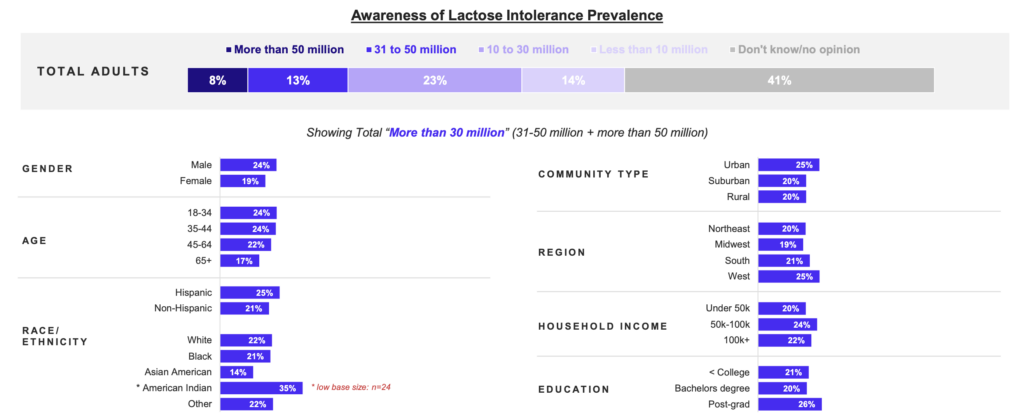
A majority of Americans agree that students should have access to plant-based meals and non-dairy milk in school lunches, aligning with a bipartisan bill in the Senate.
School students should be able to drink soy milk in their lunches if they want to, according to most Americans surveyed on the subject.
Considering the prevalence of lactose intolerance in the US and the environmental blemishes of the dairy industry, access to plant-based milk in schools should be a no-brainer. But the Big Money of Big Dairy ensures that it’s kept away from cafeterias.
It’s something politicians from across the aisle agree with, as do a majority of citizens, as a 2,200-person poll by Morning Consult and the Physicians Committee for Responsible Medicine (PCRM) revealed.
Americans are in favour of plant-based milk and meals in schools

Lactose malabsorption rates are especially high among people of colour in the US, with 65% of Hispanic and 75% of Black Americans suffering from the condition. That number rises to 90% for Asian Americans and 95% for Native Americans.
In absolute terms, government data shows that 30 to 50 million Americans (up to 15% of the population) suffer from lactose intolerance, and consumer awareness is dismally low. Only 13% of respondents to the PCRM poll correctly estimate this range, while 8% believe the number is over 50 million. Surprisingly, two in five Americans don’t know or have no opinion about lactose intolerance rates.
The survey reveals that men are more likely (24%) to correctly estimate that lactose intolerance affects over 30 million Americans than women (19%). People over 65 and non-Hispanic Americans are less likely to guess correctly.
Still, when asked if school students should have access to vegan meals and dairy-free milk, 67% of Americans agree, and only 14% say no.
This sentiment gets less popular with age: 72% of adults aged 18-34 say these options should be available on school lunches, though this falls to 61% for those aged 65 and above. Asian Americans are also in favour of this (84%), much more than white respondents (65%).
PCRM, whose Healthy School Food campaign provides free resources for schools to include plant-based recipes that meet USDA guidelines, highlighted the health benefits of expanded access to vegan options.
“Serving plant-based meals, which are higher in fibre and lower in fat than typical school lunches, can help students fight obesity, type 2 diabetes, and even early signs of heart disease and set them up for a lifetime of good health,” said Stephanie McBurnett, a nutrition educator at the organisation. “It also introduces children to healthier meals that they might not be seeing at home.”

Public opinion aligns with Senate bill and dietary guidelines
The survey shines a light on a political hot topic. Current law only guarantees students a substitute for cow’s milk if a parent submits a physician’s note documenting a disability, and prohibits schools from proactively offering soy milk on the lunch line.
But the Freedom in School Cafeterias and Lunches (FISCAL) Act, introduced by Democratic Senators John Fetterman and Cory Booker and Republican Senator John Kennedy, seeks to change that.
Currently, the National School Lunch Act requires kids to have cow’s milk on their trays for schools to be reimbursed by the government, irrespective of whether it suits them or not. The USDA already reimburses schools for 1% and non-fat cow’s milk, providing $1B to institutions across the country.
Under the FISCAL Act – a rehash of the ADD SOY Act from 2023 – schools would be reimbursed for non-dairy milk too, and students will be able to get notes from parents and legal guardians, too, to guarantee access to these products.
Facilitated by Switch4Good, the Center for a Humane Economy, and Animal Wellness Action, the bill was passed by the House Education and Workforce Committee and the Senate Agriculture Committee. It’s now awaiting discussion in the full Senate and House of Representatives, when the ongoing government shutdown ends, before heading to the desk of President Donald Trump.
PCRM noted that the current Dietary Guidelines for Americans recognise fortified soy milk as nutritionally equivalent to dairy. And in the update coming later this year, scientists advising the government have recommended an emphasis on beans, peas, lentils and other plant proteins over meat.
With public support for the measure apparent, now is the time for the government to expand access to sustainable and healthy school lunch options. McBurnett, herself a parent to school-going children, said: “We need to raise awareness that most Americans think that school lunch lines should include healthier options, including plant-based meals and non-dairy milk alternatives that can help keep students healthy.”
The post Amid Bipartisan Push, Two-Thirds of Americans Call for Dairy-Free Milk in Schools appeared first on Green Queen.
This post was originally published on Green Queen.